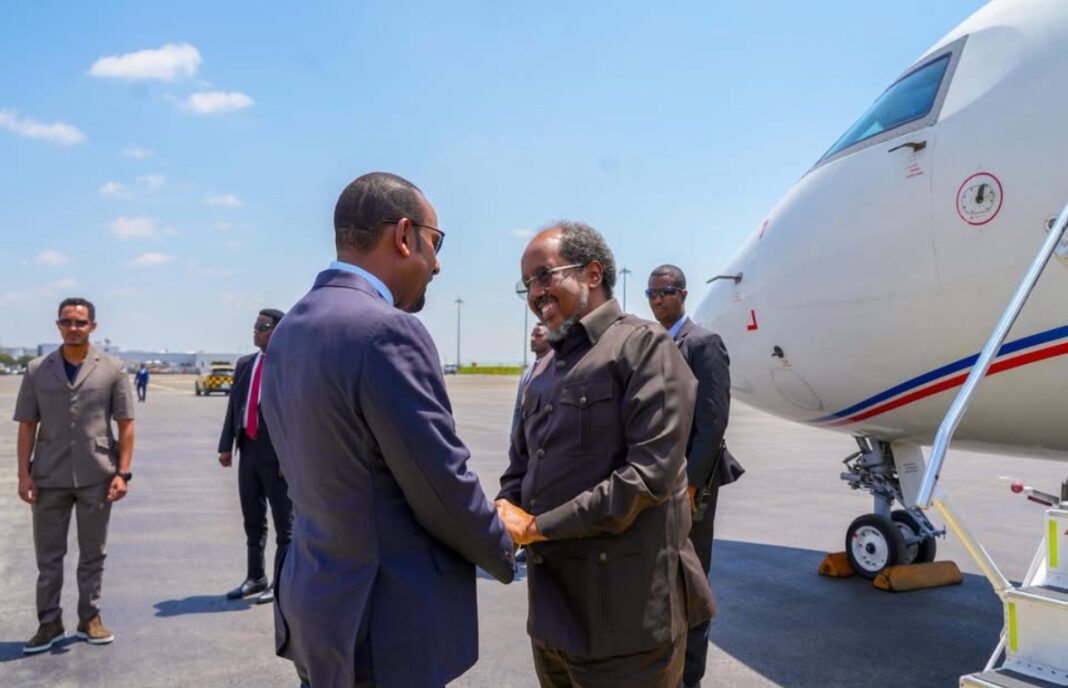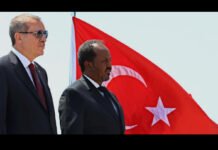MOGADISHU, (HAN) — Somali President Hassan Sheikh Mohamud is preparing for a two-day official visit to Addis Ababa, Ethiopia, as his administration steps up efforts to garner regional and international support for its ambitious — and increasingly controversial — “New Jubaland” initiative. The trip signals a major escalation in Mogadishu’s strategy to reshape the political landscape in Jubaland, a region of high strategic and economic significance in southern Somalia.
According to government sources, President Hassan will hold a series of high-level meetings in the Ethiopian capital with officials from neighboring countries, including Kenya and Ethiopia, as well as representatives from the African Union (AU). The discussions are expected to focus on securing diplomatic, financial, and political backing for Mogadishu’s plan to establish new administrative structures in Jubaland. Observers note that this move could directly challenge the authority of Ahmed Mohamed Islam “Madobe,” the sitting Jubaland President, who has governed the region since 2013.
Jubaland, which stretches across southern Somalia and shares a border with Kenya, has long been a linchpin in Somalia’s federal system. Formally recognized as a federal member state in 2013, the region has remained a focal point of tension between central government authorities in Mogadishu and local political leaders.
The region’s economic and strategic assets are substantial. Jubaland is home to fertile agricultural lands, extensive livestock production, and the critical port city of Kismayo, a key gateway for trade and import-export operations. Control over these resources provides significant leverage in Somali politics, giving Jubaland both economic clout and strategic relevance in regional security dynamics.
The “New Jubaland” initiative is viewed by many as a direct challenge to the established federal arrangements in Somalia. Since its creation, Jubaland has maintained a degree of autonomy under Madobe’s leadership, with its own security forces and administrative structures. Mogadishu’s push to implement a new administrative framework in the region could be interpreted as an attempt to centralize authority and weaken regional autonomy — a move likely to spark political resistance both locally and among Jubaland’s allies in Kenya.
Political analysts suggest that President Hassan’s Addis Ababa visit is as much about signaling intent as it is about negotiating support. “This initiative is about demonstrating that Mogadishu can influence federal states and, by extension, shape the political future of southern Somalia,” said one expert familiar with Somali politics.
Ethiopia, a key player in the Horn of Africa, and Kenya, which shares a long border with Jubaland, have significant interests in the region’s stability. Both countries have historically been involved in Somali security and mediation efforts. By engaging these partners and the African Union, Mogadishu aims to secure legitimacy for its plan and reduce the risk of regional opposition.
The initiative also has implications for Somalia’s ongoing security challenges, particularly regarding militant groups such as Al-Shabaab, which have exploited local political tensions. Strengthening central control over Jubaland could be framed by Mogadishu as a measure to enhance governance and security, although critics argue that the move could exacerbate tensions and fuel further conflict.
Madobe and his administration have not officially commented on the upcoming Addis Ababa visit, but previous signals suggest that Jubaland’s leadership views Mogadishu’s interference with suspicion. The local population and business leaders in Jubaland are closely watching the developments, aware that changes in governance could impact economic activities, trade agreements, and security arrangements.
Somali analysts warn that the “New Jubaland” plan carries both opportunities and risks. If successfully implemented with regional backing, it could strengthen Somalia’s federal government and consolidate national unity. However, mishandled negotiations could deepen political rifts, heighten tensions with neighboring countries, and destabilize one of Somalia’s most vital regions.
As President Hassan prepares for his Addis Ababa meetings, the eyes of Somalia and the wider Horn of Africa are firmly fixed on how this high-stakes initiative unfolds — and whether it will reshape the political map of Jubaland for years to come.





